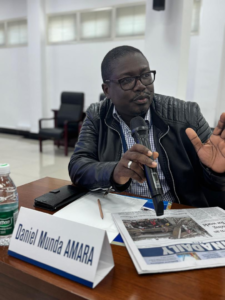By Thaimu Thullah
Background Context
Daniel Munda Amara, the Station Manager of Choice FM, a community radio station in the eastern part of Freetown, Sierra Leone, has faced significant challenges and threats due to the politically charged environment in the region. The station is primarily registered to serve the local community, providing a platform for diverse voices and perspectives. However, its location in an area dominated by the opposition All People’s Congress (APC) party has placed Amara in a precarious position.
Incident Overview
Recently, a report emerged detailing a harrowing incident where Amara narrowly escaped a violent confrontation. Hundreds of supporters from the opposition APC stormed the Choice FM building, allegedly with the intent to set it on fire. Amid the chaos, Amara managed to flee through a window, evading what could have been a tragic outcome. This attack was not merely an isolated event but part of a broader pattern of harassment and intimidation faced by media personnel in politically sensitive environments.
Reasons for Targeting
Political Climate: Sierra Leone’s political landscape is often polarized, with media outlets frequently caught in the crossfire between competing parties. Choice FM, due to its community-based focus, has become a target for those who feel threatened by dissenting voices.
November with three different attacks
In November,this year, Amara is said to have faced two attacks from Opposition supporters at his place of work. Amara’s case is one among many journalists who have been suffering in silence. This continuous harassment against journalists must stop if Sierra Leone should be seen to progress.
Media Freedom Challenges: Journalists and media managers like Amara often face harassment as a result of their editorial choices, particularly when they provide coverage that is critical of powerful political figures or parties. The APC supporters’ attack may have been fueled by perceived biases in reporting that they believed undermined their political stance.
Community Dynamics: As a community station, Choice FM has a responsibility to represent diverse viewpoints. However, this can lead to conflict in areas where political loyalties are strong, creating a scenario where the station’s management is viewed as adversarial by certain groups.
Consequences of Harassment
The harassment of Amara and the attack on Choice FM highlight the vulnerabilities that media professionals face in Sierra Leone. Such incidents can lead to:

Censorship and Self-Censorship: Fear of reprisals may lead journalists to avoid covering critical issues, undermining the role of the media as a watchdog.
Impaired Public Discourse: The intimidation of media figures disrupts the flow of information and hampers healthy public debate, ultimately affecting democratic processes.
Calls for Protection: Incidents like these underscore the need for stronger protections for journalists in Sierra Leone, as well as calls for accountability for those who perpetrate violence against media personnel.
Conclusion
Daniel Munda Amara’s experience is emblematic of the challenges faced by many journalists in politically volatile environments. As Sierra Leone continues to navigate its political landscape, the safety and freedom of the press remain crucial for fostering a vibrant democracy. Advocating for the protection of media professionals is essential to ensure that they can operate without fear of violence or intimidation.